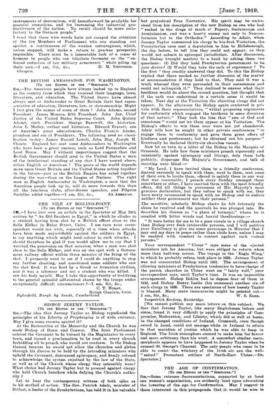BISHOP. JEREMY TAYLOR.
ITo THE. EDITOR OP THE SPECEATHIL."3 Ste,—The idea that Jeremy Taylor as Bishop repudiated the principles of his. Liberty of Prophesying is of wide currency. May Igive some reasons against it?
At the Restoration of the Monarchy and the Church he was made Bishop of Down and. Connor. The- Irish Parliament ordered the Covenant to be burned by the Magistrates in every town, and loaned a proclamation to, be reed in every church. forbidding all to preach who would not conform. Is the Bishop. blamed because he would, not allow the churches and glebes through his diocese M be held by the intruding ministers who, upheld the Covenant, derounced.eptscopacy, and firmly ref need to acknowledge the system enjoined by the law. of the State, as well as of the Church whose clergy they ostensibly were? What choice had Jeremy Taylor but to proceed against clergy who held Church benefices while defying, the Cliurelis autho- rity P Let ns hear the contemporary, witness. 0: both shies as to his method of action. The-Rev. Patrick- Adair, minister of Belfast, a leggier of the lireelryteriane, has tolditimhievaluable but prejudiced True Narrative. His spirit may !ie.:slider- stood, fronr his description-.of the new Bishop as one who had eueked in. the dregs of. meek: of Popery, &Hi ItiOH ism and- Arminianisra, and- was a hearty enemy not only to Noncon- formists but to the Orthodox." According to Adair, when. Jeremy Taylor summoned his clergy to hie first. Visitation, the. Presbyterian ones sent a deputation: to him to- Hillsborough; the day before, to tell biro they could net. appear, as- they' would not submit to episcopal jurisdiction, After- discussion„ the Bishop- brought matters to- a head by asking; them- two. questions: (1) Did- they hold Presbyterian government to be. lore divine? (2) Would they take the oath of supremacy.? To the: first " they readily answered they did. To this the.Bishop. replied that there needed no- further discourse of the matter of accommodation if they held to that. They said it was a. trnth whereof they were persuaded in their consciences. and, could not relinquish it." They declined to answer what their, brethren would do about the second question, but-thought. that, if the oath was understood in a certain sense it would he. taken. Next day at the-Visitation the objecting clergy did not appear. In the afternoon the Bishop again conferred in pri- vate with their representatives, " withal proposing arguments for conformity which engaged the brethren in same discourse of that nature." They took the line that "awe of God and conscience" would not let-them appear at his Visitation. The: Bishop's efforts to win. them over were not yet abandoned. Adair tells how he sought in other private conferences-" to. engage them to conformity end gave- them great offers of kindness and preferment; but he. obtained not hie purpose." Eventually he declared thirty-six-churches va.cant.
Now let us turn to a letter of the Bishop- to the Marquis of. Ormonde; He tells how these- ministers preach rigorously and constantly against episcopacy and liturgy, defy them both, publicly, disparage- His Majesty's Government, and talk of: resisting unto blood :— " Iffy Lord, I have invited them to a friendly conference,. desired earnestly to speak with them, went to them, sent some. of their. own to invite them, offered to satisfy them in any way, that was reasonable; I preach every Sunday amongst them somewhere or other, I have. courted them with the most friendly offers, did all things in pursuance of His. Majesty's most gracious- declaration, but they refuse to speak with me, they have newly covenanted to speak with no Bishop and to endure neither their government nor their persona."
The sensitive, scholarly Bishop shows he felt intensely the. abuse he received and the quarrels he was plunged into. Ho- describes. his diocese as "a_ place of torment." where he is assailed with bitter words and horrid thre;tenings:—
" It were better for me to be a poor curate in a village ohureh than Bishop over hell intolerable persons, and I will petition your Excellency to give me some parsonage in Munster-that I may end my days in peacerather than abidehere, unless I may; be enabled with comfort to contest against such violent. persons."
Your correspondent " Ulster " says: some of the- ejected, ministers- left for America, but were obliged to return when: more- than half-way across. The voyage in the ' Eagle. Wing,' to which- he probably refers, took place in 1686.. Jeremy Taylor was not consecrated Bishop until 1661. The arrangement' of allowing ministers of Presbyterian tendencies to have charge of the parish churches in Ulster went on "fairly well," your correspondent says, until Taylor's time. It was, an impossible arrangement. Bishop Echlin • had to: depose four- of them in 1632, and Bishop Henry. Leslie- (his successor) another- siieof such clergy in 1686. These are specimens of how looeely -Taylor is.- blamed. Many more.inaoeuraciee might be pointed out.— I am, Sir, Ac., W. S. Knee, Seapatriek Rectory, Banbridge.
[We cannot publish any more, letters this subject.. We fear. that Jeremy Taylor, like many- Englishmen:before: and, since,, found it very difficult- to apply- the principles of Come promise, Modesation, and Liberty; which: did•so well at .home; in the ohenged conditions.of:Ireland.: Cromwell, even though- sword- in. hand, could not manage, while • in Ireland. to attain to that meridian of justice which he was able, to- keep in England. The Dish atmosphere seemed to make him feaeflerear and more arbitrary thanhis wont. A somewhat similar. meta- morphosis appears to have happened to Jeremy Taylor wheirhe orossed,St. George's Channel. The only people who seem to be able- to resist: the witchery of: the Irish air- are the. well- "salted" Protestant settlers, of IforthXdist• Ulster.—Bin Spectator.]


































 Previous page
Previous page